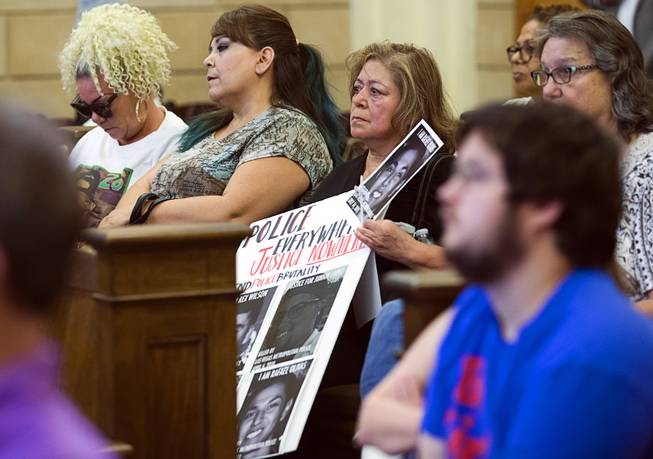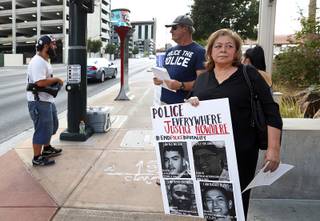
Alma Chavez, center, attends a Police Use of Force panel at the Mob Museum Wednesday, July 25, 2018. Chavez’ son Rafael Olivas was shot and killed by police in 2011. Chavez filed a federal civil rights lawsuit against the officers and the Metro Police Department but the case was dismissed by a U.S. District judge.
Thursday, July 26, 2018 | 2 a.m.
Related content
- Feds praise Metro on use-of-force reforms as police shootings plummet
- Metro demonstrates progress and revamped use-of-force policies
- Cop charged in choke death ignored officer who said ‘let him go’
- Metro officers fatally shoot man, 23, armed with knife
- Race and unrest: Las Vegans speak out about racial tension and policing
Alma Chavez stood outside the Mob Museum on Wednesday evening holding a poster with the photos of four men killed by Metro Police. One of them, 23-year-old Rafael Olivas, was her son.
Seven years ago, Chavez summoned Metro officers to her Las Vegas home to help Olivas, who was going through an “emotional” episode. But when he approached officers with a knife, he was fatally wounded. Chavez is still disillusioned with the agency.
During a panel discussion at the museum about Metro overhauling its use of force policies, Capt. Kelly McMahill had a message for grieving mothers like Chavez: “I’m sorry.” The overhaul was partly due to recommendations by the U.S. Justice Department in 2012 after a string of controversial police shootings around the time Olivas was killed.
Chavez held a photo of her son smiling with text that read, “I Am Rafael Olivas: Killed by Las Vegas Metropolitan Police July 14, 2011.”
“Police (have) failed to remember the people who are at the other end,” McMahill said.
The backlash the deaths caused in the community was part of the reason the Justice Department helped Metro revamp its policies. In 2010, for example, police opened fire 25 times, fatally wounding seven people in separate incidents. About half of the shootings could've gone the other way, McMahill said.
Collaboration between the entities, and the 70-plus recommendations implemented by Metro, have garnered praise from the federal agency. Now, other departments are following Metro’s lead.
Metro credits community-oriented policing, de-escalation tactics, reality-based training and transparency for the improvements. No more than four hours after an officer opens fire, Metro provides a preliminary rundown to the public. Two days later, the officers involved are identified, and in the next day or so, a detailed briefing with body-camera footage and radio traffic is given.
The shootings are investigated by two teams. One examines the criminal element of the incident and another focuses on policy. Lessons learned from each shooting are implemented into the policy and future training, McMahill said. There’s still more work to do, she added.
Chavez, the grieving mother, agreed.
She’s troubled that a lot of the investigative processes are internal, and she doesn’t trust police to investigate their own, she said. “We want real changes,” she said.
The conversations about deadly force aren’t comfortable, but they’re necessary, the panel said.
Since her son’s death, Chavez said, she’s interacted with multiple family members who have experienced the same pain.
“Unfortunately, I continue meeting more people who come to our painful club — more mothers with sorrow because their kids were killed,” she said. “Since my son was killed, my life is different; my life is done. Every single day, I grieve. There’s no happiness for me. What can I tell you? I’m so brokenhearted.”
Demonstrators stood outside before the event and some, like Chavez, made it inside and listened peacefully. A man who wore a shirt that said “Police the Police” passed out photos of Tashii Brown, who died after an officer shocked him several times and put him in a chokehold during a May 2017 incident on the Strip.
The now-former officer, Kenneth Lopera, is facing charges of involuntary manslaughter and oppression under the color of office.

